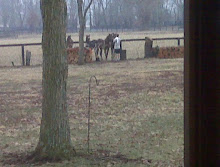Damascus, a prototypical iron horse.
The intervals between his races during his 3 year old year were:
2 weeks
3 weeks
1 week
2 weeks
3 weeks
3 weeks
10 days
3 weeks
1 week
3 weeks
1 week
16 days
26 days
28 days
2 weeks
And he got stronger as the campaign wore on. I have no specific info, but horses during those days were often breezed 1 mile in between races that were a week or so apart.
Today's superstars rarely make 11 starts in a career. Who is to blame: breeders, trainers, or the economic model? I blame the latter, you are crazy to race for $750k purses when you can head to the breeding shed and make that in 6 months with no injury risk.
But, the above shows that horses get stronger if trained/raced properly. They are not inherently fragile. If given the correct exercise stimulus, then allowed to recover properly - they grow stronger. They are living organisms built of cells that follow the laws of science.
Run an automobile with a 200HP engine at 210HP, and you blow the engine.
Run a horse with a 200HP engine at 210HP, he grows into a 210HP engine. Now you can run him at 220HP safely, etc.
Problem is, you have to quantify both how big an engine he is now, and what his next workout should be in terms of speed/duration/frequency. Quantification is done by collecting data: both from the workout AND his physiologcal response to said workout.
That takes extra work and attention to detail. If you are happy with your current strike percentage, then I am happy for you. If not, you must do something different in order to expect different results in the future.
Look back to the days of the iron horse for lessons and put them into practice in today's environment for a true edge on the competition.
Tuesday, February 23, 2010
Wednesday, February 17, 2010
Equine Exercise Psychology
"Indeed, genetic alone is not the determining factor for success or failure.
But, rather it is the mind of the horse that is in complete control of the will, and thus performance, on and off the racetrack.
This makes it very clear that while physical ability is important, the mental capacity of the equine controls the physical output of the athlete. "
-Kerry M Thomas
www.thomasherdingtechnique.com
This guy is fantastic, talked to him at length earlier this week and he really has a handle on an area of performance that NO ONE actively trains to improve. Please check it out.
But, rather it is the mind of the horse that is in complete control of the will, and thus performance, on and off the racetrack.
This makes it very clear that while physical ability is important, the mental capacity of the equine controls the physical output of the athlete. "
-Kerry M Thomas
www.thomasherdingtechnique.com
This guy is fantastic, talked to him at length earlier this week and he really has a handle on an area of performance that NO ONE actively trains to improve. Please check it out.
Subscribe to:
Comments (Atom)



